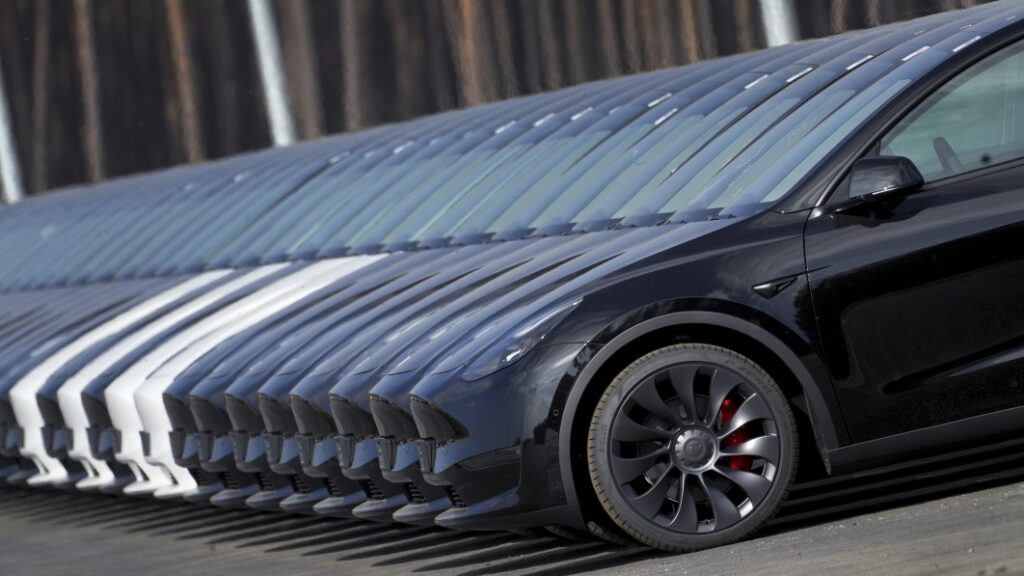Tesla deliveries up 38% as price cuts, year-end sales push pay off

Tesla delivered a record number of electric vehicles in the fourth quarter, beating market estimates and meeting its 2023 target of 1.8 million vehicles as a year of price cuts and a year-end sales push paid off.
The automaker delivered 494,989 vehicles in the quarter, but it fell short of the 526,409 fully electric vehicles handed over by China’s BYD, Tesla’s main global rival.
Warren Buffett-backed BYD’s annual deliveries were 3.02 million, though that included about 1.4 million plug-in hybrid EVs, meaning Tesla was still ahead in fully EV deliveries for the year.
BYD’s deliveries show price cuts are working for the Chinese company, said Susannah Streeter, head of money and markets at Hargreaves Lansdown.
“The fight will hurt margins for both companies, but BYD clearly believes it’s a price worth paying to increase market share and recognition,” she added.
Tesla increased discounts and offered incentives like six months of free fast charging if customers took deliveries by December-end, in a bid to boost sales before some variants of its compact Model 3 sedan lose U.S. federal tax credits in 2024.
That helped it post a growth of 11% over the immediately previous quarter and higher than estimates of 473,253, according to 14 analysts polled by LSEG.
It made a record 494,989 vehicles in the quarter after the third quarter was beset by a production halt to upgrade assembly lines, taking total production in 2023 to 1.85 million units.
Tesla shares were flat in a broadly weaker market.
“Tesla is sticking to their guns and delivery numbers being up 38%, that’s not the 40% that CEO Elon Musk liked to see but it’s much, much, much better than domestic U.S. car companies,” said Gary Bradshaw, portfolio manager at Tesla shareholder Hodges Capital.
Smaller rival Rivian also reported deliveries on Tuesday, with the company missing market estimates amid a broader pullback in EV demand.
The weakness has led U.S. automakers including Ford and General Motors to become more cautious about their EV production capacity plans.
Tesla is facing scrutiny from regulators over its self-driving technology with the company recalling more than 2 million vehicles last month to install new safeguards in its Autopilot advanced driver-assistance system, after a federal safety regulator cited safety concerns.
Consumer Reports — an influential U.S. nonprofit that conducts extensive reviews of cars and other goods — said its preliminary evaluation suggests the software update to fix issues were not sufficient and did not go far enough to prevent misuse and driver inattention.
Tax credits
Some analysts said Tesla could have to continue the price cuts it started in January last year to maintain demand, after the end of the tax incentives under the Inflation Reduction Act (IRA) brought forward sales into the fourth quarter.
“Tesla may have to cut prices further, especially for a vehicle like the versions of the Model 3 that lost their tax credit,” said Seth Goldstein, equity strategist at Morningstar.
The rear-wheel drive and long-range variants of Tesla’s Model 3 no longer have federal tax credits of $7,500 this year as updated requirements on battery material sourcing kick in, under the IRA.
Goldstein, however, said that most of the price cuts were in response to higher interest rates by the U.S. Federal Reserve so Tesla may maintain prices if borrowing costs start coming down.
Model 3 cars and Model Y sports utility vehicles accounted for 461,538 deliveries in the quarter, while Tesla handed over about 23,000 units of its other models.
Tesla did not disclose if the deliveries included the newly launched Cybertruck.







